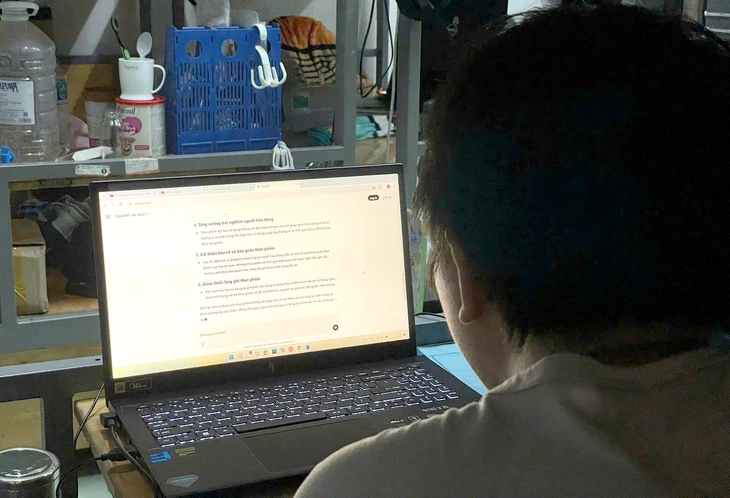
More and more students are abusing AI in their graduation theses and exams - Photo: HO NHUONG
How to effectively use artificial intelligence (AI) without becoming a slave or victim of AI? Discussing this issue, Mr. Vo Tu Duc - Google's first Google WorkSpace expert in Southeast Asia - said that we need to take a serious look at how to approach and use AI responsibly.
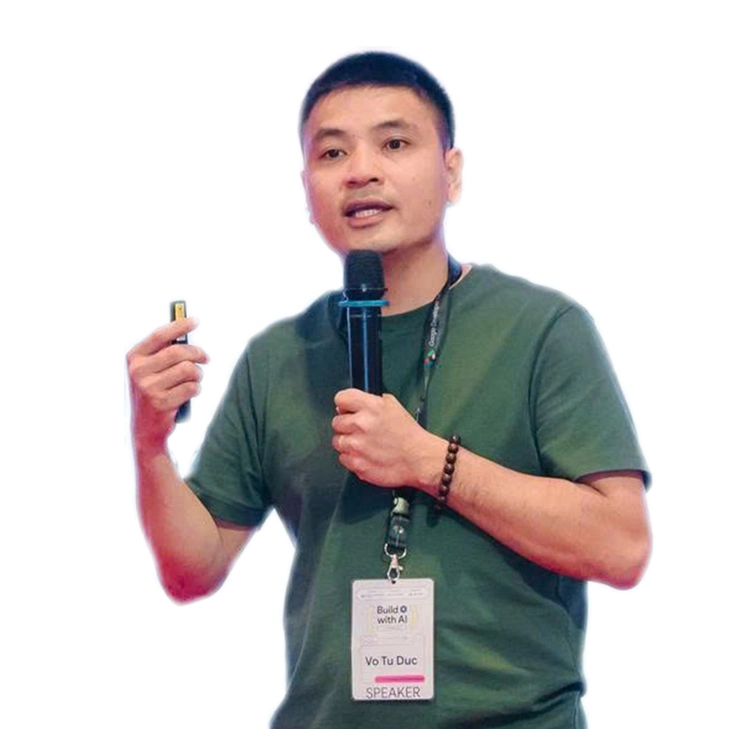
Mr. Vo Tu Duc
* Sir, recently, many students have admitted that they rely heavily on ChatGPT when writing their graduation thesis. In your opinion, how should this be viewed, is it an opportunity or a concern?
- This is inevitable and a good opportunity if used properly. The more you use something, the easier it is to become dependent. Dependence on AI is the most dangerous dependence, similar to the most dangerous dependence that everyone knows: dependence on thinking, on a certain ideology.
Currently, there is no specific data to prove how much time each person spends reading or re-reading the results after receiving an answer from ChatGPT. But in my personal opinion, people often do not check carefully before passing that information on to others. This is a real concern.
But the outstanding effectiveness when applying AI correctly is indisputable. The world in general, and big tech companies in particular, have been pouring trillions of dollars into AI, which speaks volumes about the power and capabilities of AI.
Big companies like Google are even repositioning themselves now. Before, when we talked about Google, Google wanted us to see them as a search engine company, but now, they want us to see them as an AI company. This is because of AI and its potential, the opportunities it brings.
* As a technology expert, what suggestions do you have for using AI effectively to support students in steps such as searching for documents, building outlines... while still maintaining independence in thinking?
- First, you need to equip yourself with knowledge or take courses to understand AI correctly. Avoid misunderstanding, doing wrong, exploiting wrong and becoming a "free data provider" for AI by typing data into it. The fastest way is to learn about prompt engineering.
Second, with or without AI, critical thinking must always be upgraded. When AI returns results, students should test and practice their critical thinking ability by asking questions or finding out the unreasonable points in the results that AI returns.
Before pressing the "enter" button to give an order to AI, you should reread the question yourself to see if you have asked the question correctly. This is the first step in the process of reasoning and independent thinking, the core factor that helps users not to be too dependent on technology.
In the past, when we searched for documents on Google, we received a series of results including title, short description and link. We may have to read through many pages to select the necessary information.
AI tools can now quickly aggregate information directly related to the question, displaying concise results with clear quotes. More importantly, this happens in just one result.
And finally, in a way, AI is a tool. Since it is a tool, the more synchronous the better. Therefore, prioritize using AI models that are built into the tools you often use. If you write your thesis on Google Docs or MS Word and can query AI right there, then you should take advantage of that for convenience and efficiency.
* In your opinion, what role do schools and lecturers play in guiding students to use AI correctly and effectively?
- I think many schools and lecturers are currently quite confused by the reality: before, they gave students a week to complete the assignments, but now students can submit their assignments in three days, and the assignments are often written by AI.
How to properly test and confirm that your students have actually absorbed the knowledge you want to impart becomes a challenge not only for teachers but also for bosses in the workplace.
However, for me, the role of a teacher has not changed. Teachers have long been not only imparting knowledge, but also being a moral example. No one wants to receive knowledge from a teacher who lacks standards. This shows the profound influence of teachers on students.
Regarding AI expertise, if teachers are not really knowledgeable or do not have much experience, they can focus on guiding students to learn correctly from the beginning, avoiding wrong learning leading to wrong application.
As for ethical leadership, teachers can start by exploring the topic, and this topic is especially important: “AI safety.” For example, understanding the harms of deepfakes (fake, misleading content), bias (incorrect, manipulated information), and why AI is prone to creating them.
Once they understand the nature, teachers will proactively warn students so that they do not fall into a situation where they make themselves unsafe when using AI.
Popular academic tools
According to studies on AI usage in 2025 in the UK, US, and Canada, AI is becoming a popular academic tool. Specifically, in the UK, 92% of university students use AI in their studies, a sharp increase from 66% in 2024. Of which, ChatGPT is the most popular application, often used to summarize articles, explain concepts, support essay writing and conduct academic research.
In the US and Canada, 84% of faculty and staff in higher education have applied AI in their work or personal lives, up 32 percentage points from the previous year.
In particular, in the classroom environment, AI integration is increasingly evident: 45% of university lecturers and 51% of K-12 teachers in the US are using AI to support teaching and learning activities.
Source: https://tuoitre.vn/chuyen-gia-google-vo-tu-duc-de-khong-tro-thanh-nan-nhan-no-le-cua-ai-20250618092853816.htm



![[Photo] National Assembly Chairman Tran Thanh Man attends the VinFuture 2025 Award Ceremony](/_next/image?url=https%3A%2F%2Fvphoto.vietnam.vn%2Fthumb%2F1200x675%2Fvietnam%2Fresource%2FIMAGE%2F2025%2F12%2F05%2F1764951162416_2628509768338816493-6995-jpg.webp&w=3840&q=75)


![[Photo] 60th Anniversary of the Founding of the Vietnam Association of Photographic Artists](/_next/image?url=https%3A%2F%2Fvphoto.vietnam.vn%2Fthumb%2F1200x675%2Fvietnam%2Fresource%2FIMAGE%2F2025%2F12%2F05%2F1764935864512_a1-bnd-0841-9740-jpg.webp&w=3840&q=75)





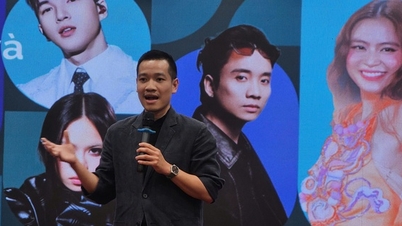






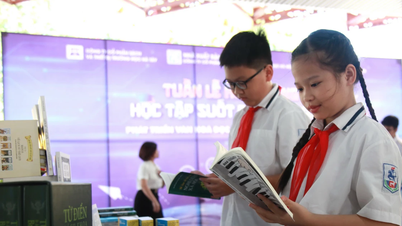



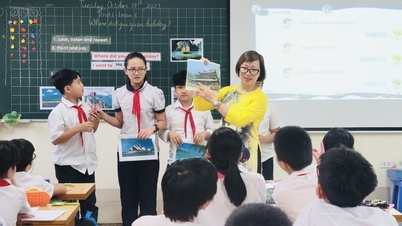

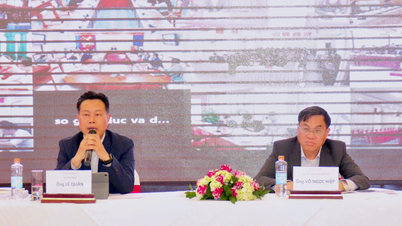

















































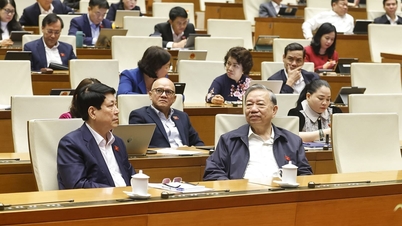













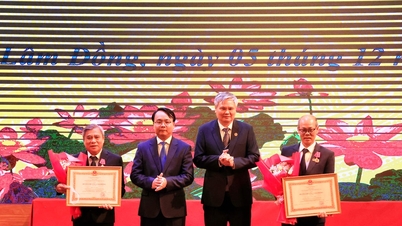
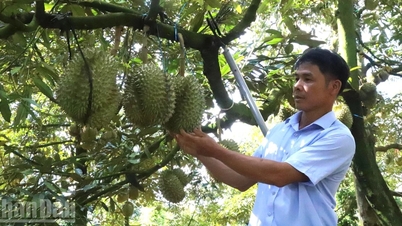

















Comment (0)